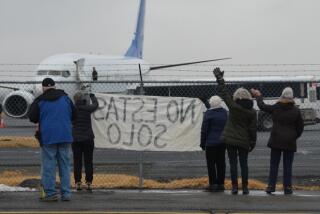An ‘Unfortunate’ Security Error
- Share via
WASHINGTON — In a case of mistaken identity that sent a shudder through the capital’s large corps of foreign professionals, U.S. agents handcuffed a Spanish economist and took him off an international flight here because his name matched that of an individual on a watch list, officials said Wednesday.
Alex Segura-Ubiergo, who works at the headquarters of the International Monetary Fund, was returning from a business trip Saturday when he was detained. His wife, who is eight months pregnant, had gone to pick him up at Dulles International Airport and waited for hours before being told he was being questioned. He was released after the error was cleared up.
“We apologize for the inconvenience,” said Christiana Halsey, a spokeswoman for U.S. Customs and Border Protection. “At the same time
Halsey said she could not divulge whether the person on the watch list was suspected of being a terrorist or a criminal of some other type.
The incident prompted an official complaint from the IMF, which lends money to governments and acts to promote worldwide economic growth. Other international organizations said they would press the U.S. to set clear guidelines on handling their employees, who travel frequently.
“The IMF is extremely concerned about this development and has asked [its U.S. representative] to raise this with the appropriate authorities,” said spokesman William Murray.
The IMF’s acting managing director, Anne Krueger, said in an e-mail to the fund’s 3,000 Washington-based employees that the complaint would be raised “strongly -- at the highest level -- to try to prevent other staff members from being subjected to such treatment.”
Krueger said another IMF staff member was recently prevented from boarding a flight from New York to Pakistan. Other foreign professionals, including a German economist with the World Bank, have recently complained of problems with U.S. border agents.
Details of Segura-Ubiergo’s experience were circulated in Washington in an e-mail he wrote to colleagues, which was provided to The Times. Segura-Ubiergo was not available for an interview.
Thousands of foreign professionals work in Washington for international organizations such as the IMF, as well as for embassies and corporations.
Segura-Ubiergo, 33, said in his e-mail that, in addition to his Spanish passport, he had a special U.S. visa identifying him as an employee of an international organization and a United Nations passport issued for official travel. The IMF said he also had documents showing he was a Washington-area resident.
According to Segura-Ubiergo’s account, Air France Flight 28 from Paris had landed at Dulles and passengers were preparing to disembark when a flight attendant asked them to return to their seats, saying officers from the Department of Homeland Security were about to board the plane.
The armed agents went straight to Segura-Ubiergo and requested his passport, then asked him to follow them, he said in his e-mail. As they were leaving the plane, he said, the officers told him he would have to be handcuffed.
“I explained I was a staff member of the International Monetary Fund coming back from an official mission,” he said in his e-mail. “I told them that I could understand that they might have to question me, but that I felt handcuffing me was absolutely unnecessary.”
Halsey said the agents had no choice but to use handcuffs. “That is the protocol in place for a match like that,” she said.
The incident was not linked to the alerts over the Christmas holidays that led to the cancellation of several flights to Washington from the United Kingdom. “There was no threat against the flight,” Halsey said. “The threat was that somebody might be trying to impersonate Mr. Segura and fraudulently enter the United States.”
Segura-Ubiergo said in his e-mail that he was taken to an office for questioning and the handcuffs were removed. After about an hour, he said, he asked to call his wife, explaining that she was pregnant, but was told he could not use the phone.
“If he had been a terrorist and we allowed him to make a phone call, that could breach security,” Halsey said.
Eventually, an officer “was kind enough to walk outside and tell my wife that I was being held,” Segura-Ubiergo said in his e-mail.
He was released after about three hours -- and given conflicting advice. One officer suggested that he get a new passport. Another said that everything had been fixed and that getting a new passport was not a good idea.
“It is unfortunate this happened, [but] the inspectors treated him with respect,” Halsey said.
Another department official said cases of mistaken identity were a problem for all law enforcement agencies and were sometimes unavoidable.
Steps have been taken so Segura-Ubiergo will not be inconvenienced again, Halsey said, adding, “The next time he travels, hopefully this will not occur.”
But Segura-Ubiergo was shaken. “It will be hard for me to ever view the U.S. as ‘home, sweet home’ when coming back from a mission,” he said in his e-mail.
More to Read
Sign up for Essential California
The most important California stories and recommendations in your inbox every morning.
You may occasionally receive promotional content from the Los Angeles Times.









